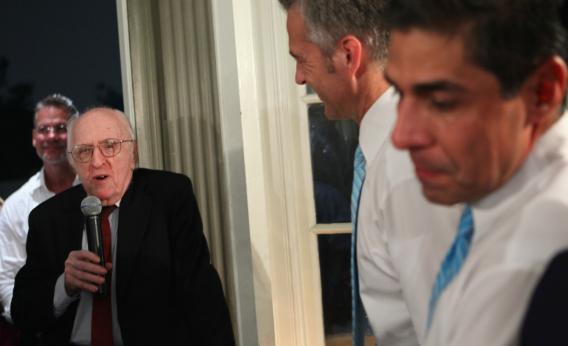Frank Kameny’s little house in Northwest Washington, with its falling gutters and swaybacked sofa, must be the most modest building ever named a historic landmark. Kameny lived in the house on Cathedral Avenue for decades, and for decades, gay men who thought they were alone in the world, walked up the path of broken weed-choked stones to find … a movement. When Kameny died in his bed Tuesday night, aged 86, he had changed the world.
Opening the door for our interview two years ago, he greeted me with a framed copy of the letter he had just recently received from the U.S. government, apologizing for firing him from his job as an astronomer in 1957 because he was gay. Getting fired from the civil service for homosexuality was a common occurrence in the 1950s, especially after President Dwight Eisenhower had issued Executive Order 10450 mandating the termination of anyone guilty of “sexual perversion.” In his book The Lavender Scare, historian David K. Johnson tells the story of one such civil servant who, within minutes of being told he had been caught and fired, shot himself in the head at the corner of 21st Street and Virginia Avenue.*
I asked Kameny whether he had ever contemplated suicide. After all, he had dreamed of being an astronomer since he was a little boy, going to the New York Planetarium each time there was a new show. And he had written of his hopes of becoming an astronaut before the record of his arrest in a San Francisco bathroom ended his aspirations forever. “Oh no no!!” he responded. “Never. Not for a single moment.” When the government fired him, he remembers, he knew it was wrong. Why should his harmless behavior cost him his job any more than a person should be fired for having black skin? “If I disagree with someone,” he told me, “I give them a chance to convince me they are right. And if they fail, then I am right and they are wrong and I will just have to fight them until they change.”
Instead of putting a gun to his head, he sued the United States for reinstatement. When the Supreme Court ended his hopes by refusing to review the adverse decisions of the lower courts, he decided he would have to find his redress in politics. In 1961, with a handful of his friends, he started the first militant homosexual organization of the modern era, the Mattachine Society. The activist cause du jour, Occupy Wall Street, prides itself on being a movement without leaders. Kameny was a leader. For a long time, he was a leader without much of a movement. When the uprising at Manhattan’s Stonewall Inn prompted the gay version of Occupy Wall Street, the leaderless Gay Liberation Front, Kameny jumped right in. Finally the leader had a movement.
And the movement had a leader. Kameny hated the formless anarchy of the Gay Liberation Front. “They talked endlessly,” he remembered with a disdain unmitigated by the passage of time. “And nothing ever got decided.” But he went to the meetings faithfully. And when the American Psychiatric Association, which defined homosexuality as a mental disorder, decided to hold a meeting in Kameny’s hometown, he quickly organized the disorganized protesters of the GLF and the alphabet soup of other burgeoning gay organizations to disrupt the meeting. They then and force the shrinks to listen to their claims that they were not crazy.
When the moment came, the protesters upended the psychiatrists’ convocation, and actual fighting broke out, with the doctors using the medals they had just been awarded to beat back the invading homosexuals. Kameny, seeing that the designated protest speaker had been pushed out of the meeting room, leaped onto the stage. “I saw that nothing was going to happen unless I did it,” he recalled. The psychiatrists had taken away the microphone, but “I never needed a microphone. And I knew exactly what to say because I had been speaking about how wrong they were for years.”
And so Frank Kameny proceeded to regale the assembled professionals with his recitation of how their diagnosis of homosexuality as a mental illness was unscientific, groundless, immoral and harmful. Two years later, the APA took homosexuality out of the Diagnostic and Statistical Manual. Not Crazy. Two years after that, the federal government explicitly rescinded Executive Order 10450.
Leaderless movements are colorful, but movements led by people who know they are right and are willing to fight for what they believe are more likely to make real change. When the U.S. military finally repealed its “don’t ask, don’t tell” policy last month, Kameny was so pleased. He’d always resented having to lie about his sexuality in order to fight the Nazis in World War II. But he did it. After all, they were wrong and he was right, and, if they didn’t change their behavior voluntarily, well, he was just going to have to make them.
Correction, Oct. 13, 2011: This article originally misidentified the author of the book The Lavender Scare as David Allyn. (Return to the corrected sentence.)
